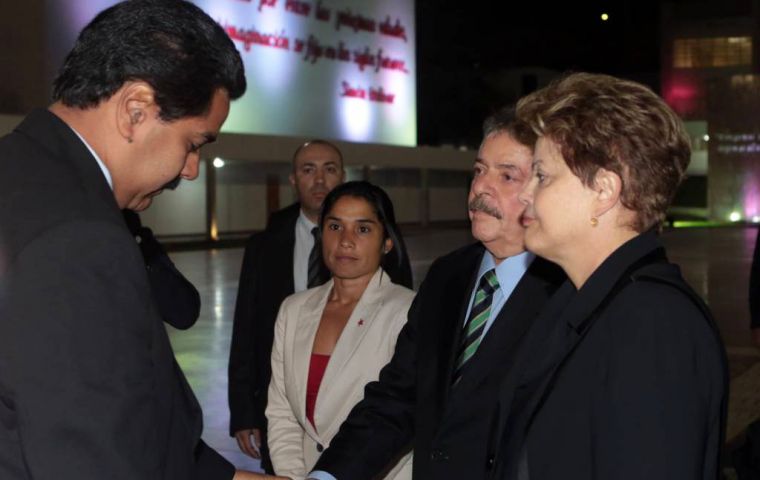MercoPress. South Atlantic News Agency
Brazil pledges support for Venezuelan transition but takes distance from Chavez populism
 Rousseff and Lula da Silva limited their time in Caracas and missed the official ceremony on Friday
Rousseff and Lula da Silva limited their time in Caracas and missed the official ceremony on Friday By leaving Venezuela before Friday’s funeral ceremony for leader Hugo Chávez, Brazilian President Dilma Rousseff was once again trying to chart out a more moderate signal to investors and diplomats, plus probably avoiding Iranian president Mahmoud Ahmadinejad, whom contrary to her predecessor Lula da Silva, she has strongly criticized.
Rousseff expressed sincere mourning while also keeping a certain distance from Chavez’s legacy just hours after his death on Tuesday. In a speech, she expressed admiration for the populist leader but also pointedly added that Brazil “did not entirely agree” with many of his policies.
The president and Lula da Silva have over the past ten years espoused a more pragmatic, business-friendly set of policies than Chávez, who was well-known for lashing out at Washington, expropriating companies and intimidating his political rivals.
Those close to Rousseff say she genuinely admired Chávez and his compassion for the poor, and was emotionally devastated by his death from cancer at age 58.
However, Rousseff and Lula da Silva also took numerous opportunities during the week to politely highlight disagreements with Chavez, which officials said was a carefully crafted campaign to draw a distinction between Brazil and Venezuela in the eyes of the international community and business leaders.
“The simple message is: ‘We’re different’” said Marco Aurelio Garcia, an advisor to the Brazilian Executive. “Yes, we respect many things he did, and there is a shared cause... but Brazil is not the same as Venezuela.”
Such a message could bolster Brazil’s reputation as a leader among Latin American governments that in recent years have embraced its more moderate approach, marrying robust social policies with free-market principles.
Likewise Brazil ongoing lobby to reform the UN and obtain a permanent seat at the Security Council also calls for a more moderate approach to world affairs.
Rousseff and Lula da Silva did travel to Caracas on Thursday and joined a long line of well-wishers who visited Chávez’s casket. Rousseff also offered acting President Nicolás Maduro non-financial assistance in coming months if he wins an election to succeed Chávez, an official said.
The offer included technicians from Brazil’s vaunted “My House, My Life” public housing program to help work on similar projects in Venezuela.
Nonetheless, both Rousseff and Lula da Silva departed Venezuela prior to a funeral ceremony on Friday that was attended by dignitaries from more than 30 countries. Argentine President Cristina Férnandez de Kirchner was also absent from the Friday ceremony, although she attributed her early return to Buenos Aires to health reasons.
Rousseff had an additional reason to leave: avoiding Iran’s leader whom she has strongly criticized on human rights issues and the way women are treated by Teheran regime. Lula da Silva on the other hand while president established close links with Iran and Ahmadinejad visited Brazil during his eight year mandate.




Top Comments
Disclaimer & comment rules-

-

-

Read all commentsAll the female LA leaders are avoiding Ahmedinejad. He should really do something about the grip religion has on his society and especially the medieval look it has on women. I'm politically glad Ahmadinejad showed up in Venezuela, and I'm humanly glad our female leaders chose not to be there.
Mar 11th, 2013 - 08:25 am 0Stevie,
Mar 11th, 2013 - 05:14 pm 0Although I agree with your point above, the women in question are keeping a safe distance from Chavismo (as well as Ahmadinejad). Both understandable positions for a rational being.
Ahmedinejad is the 'elected' leader, way down the pecking order from the ayatollahs. The position of women is defined by the ayatollah's interpretations of the word of God.
Mar 11th, 2013 - 05:26 pm 0The Latin American countries of South America should be glad that their peoples have not chosen fundimental religious paths that force subservience on the females of the species.
Commenting for this story is now closed.
If you have a Facebook account, become a fan and comment on our Facebook Page!